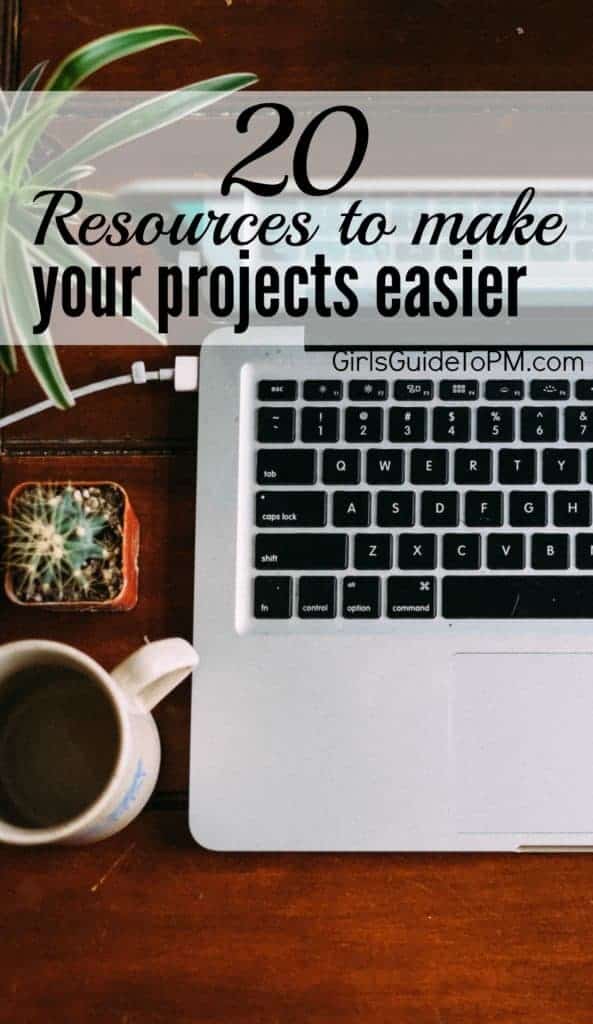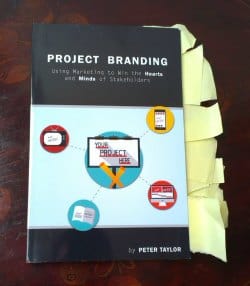20 Resources to Make Your Projects Easier
This blog is reader-supported. When you purchase something through an affiliate link on this site, I may earn some coffee money. Thanks! Learn more.
This post is sponsored by Activia Training.
Here are 20 resources and techniques I use to make my projects easier. Let’s dive straight in to the list…
Resources for your team
1. Instant messaging
I’ve tried a number of products but have settled on Skype. I know the primary reason for using Skype isn’t to type messages but it works because the people I want to talk to are on it. As a team we use Skype a lot for a quick confirmation of facts in meetings or to get a status update.
My Social Media in a Project Environment research shows that we’re not alone: 56% of project managers report using instant messaging at work and that study is a couple of years old now so I imagine it has gone up.
2. A base – even if you never visit it
It helps to have somewhere to call home. When I’m in the office I hot desk (although I have a favorite seat). When I’m at home I use my home office.
A team feels connected through a sense of shared identity, so even if you are a virtual worker 100% of the time and never visit your office, you are, at least nominally, sharing the concept of a work base with others.
3. Holiday calendar
I couldn’t manage my team without the holiday calendar. I put all their vacation dates in my Outlook diary so I can quickly see who is off today. It also stores repeating events like birthdays, grandchildren’s birthdays, anniversaries for joining the company and so on.
I also add the team’s holiday dates to the project schedule so I never make the mistake of scheduling them for work when they aren’t available.
4. Team mailing list
I have distribution lists set up in Outlook for my team, so I don’t have to type their names in individually every time I’ve got something of interest for them all. I’ve also got distribution lists for key projects. It helps me remember who gets what communication on what project when.
5. Lessons learned sessions
This is more of a technique than a resource, but we practice customer-centric project management and continuous process improvement through regularly reviewing what’s working on projects and what isn’t. These lessons can be taken forward to improve in-flight projects and future projects too.
6. Conference call number
Instant messaging is OK, but sometimes you need a chat. I use my conference call details almost daily. Conference calling or web conferencing gives you a quick way to get in touch with the team, share screens or just chat through ideas.
7. Telephone list
I don’t have everyone’s phone numbers stored in my phone. I use the online telephone directory for the company to look up the numbers of people I have to ring. It’s also useful to check their job titles and locations, especially if we had a brief chat and I asked for their name twice and was too embarrassed to ask a third time even if I still hadn’t caught it.
Technology resources
8. Online software
I use Dropbox to sync my files between my desktop and my iPad. The WordPress app means I can moderate comments and update blog posts when I’m not at my desk. When you are out and about it makes life easier to have instant access. And to think I used to email myself files to work on while I was traveling…
9. Smartphone or tablet with 3G/4G
You can only access your project files online if you have something to access them on. I don’t carry my laptop around with me all the time. If I’m working on the train I certainly don’t rely on being able to get my laptop out as I’m often packed in around other people.
My phone makes it easy to check emails while I’m traveling or during moments of downtime in the office. My iPad makes it possible to edit interview transcripts, create images, check my project plans and update documents from the train. I can also stay up-to-date with the latest project management news on Feedly and Twitter.
10. Phone/tablet cover
My new iPad is only about four months old and already the screen is scratched. And I have it in a case. I don’t know how people manage without cases. I’ve got a cheap magnetic EasyAcc case as it also happened to be the lightest. I don’t think the scratches are to do with the case, more the fact that I take the iPad out and about and the boys have dropped it a couple of times.
Paper/documentation resources
11. Sticky notes
I have a few pads of sticky notes on my desk at the moment. I like different sizes for different types of work and I use them for writing notes to myself, writing notes to other people, marking up books with quotes I like because I can’t bring myself to write on the actual book, and lots of other things.
12. Project Charter
How would you manage without this? A project charter gives you the mandate to do the project and sets out what is expected of you.
13. Change request form
Want something changed? Fill in one of these. I use the change request form on my projects to ensure that stakeholders know the implications of the change, especially if it is going to cost us money. More than a few changes have been rejected once the costs were known – it focuses people’s minds!
14. Progress report
I love my weekly project status report. It gives me a clear picture of what the team has been up to and writing it helps me work out what we’ve failed to complete this week and therefore what our priority should be the following week. Reporting like this keeps me accountable.
15. Budget tracker
My project budgets range from nothing to millions of pounds. Without a way to track expenditure and plan the budget forecast I’d be lost. I use an Excel spreadsheet but any template or software would do, as long as you have one.
16. Action log
This is probably the tool I find the most useful, because it’s effectively a task list for everyone on the project. I can filter by individual, and it’s a single home for all the actions that come out of the various meetings and phone calls we have. I like having everything in one place.
Download the action log template that I use and see if you could apply it to your project.
In the video below, I talk about how to use an action log, how to set it up, what to track and how you can create your own (or just use my Excel template).
Career development resources
17. PMI Chapter/Professional body
Being a member of your professional body does make your project easier because:
- It gives you confidence that you are doing the right thing
- It offers you sources of information for when you don’t know what to do
- If people know that you are a member, you get extra credit at work. Having the respect that comes from a credential or membership underpins your authority.
18. Conferences
I have come back from conferences feeling inspired, and that helps me face the challenges of my project. The time out of the office also recharges your batteries, and it’s energizing to be around people who have the same issues and interests as you. Being able to learn from experts and come back to my project with a new take on the situation does make it easier to get through the difficult times.
19. Mentor
A mentor can really help you on difficult projects. Right now I don’t have a formal mentor, although there are few women I look up to and take inspiration from. I have had mentors in the past (and I mentor others through my coaching service) and the difference it makes to your approach to problems is breathtaking. A non-judgemental, supportive ear to help you work through issues and come up with solutions can get your project back on track faster than any blog article.
20. Manager
Finally, don’t discount your manager. They have huge potential to make your projects easier (or harder). Remember to give them what they want in terms of reporting and to never spring surprises. I’m fortunate to have a fantastic boss and over the years we’ve developed a working style that complements both our strengths. If you can find out what makes your boss tick and work to that, your life in the office will be much easier.
Want Even More Tools?
Check out my Meetings Template Kit for everything you need to run the perfect meeting: preparation checklists, document templates, an ebook with a guide on how to chair a meeting and more.
Pin it for later:


